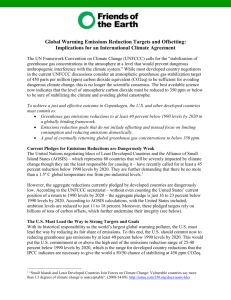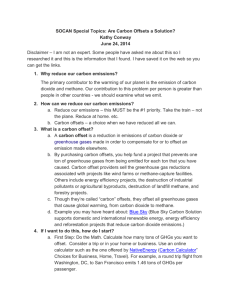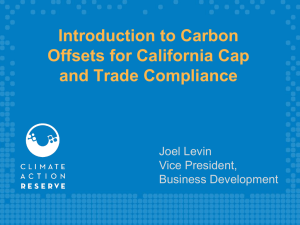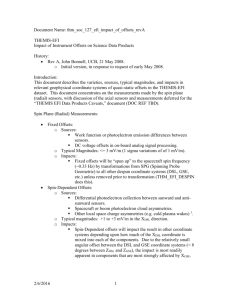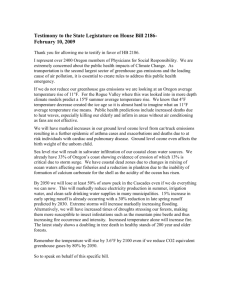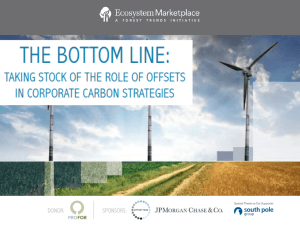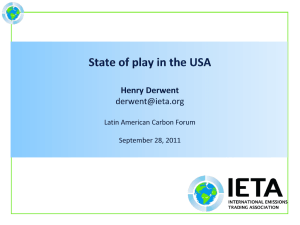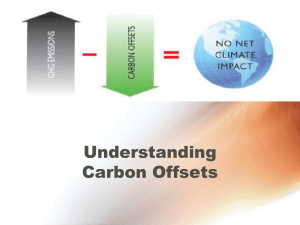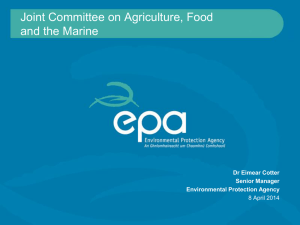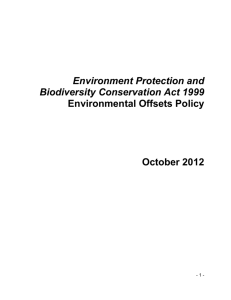Draft MCC Policy Template v2
advertisement
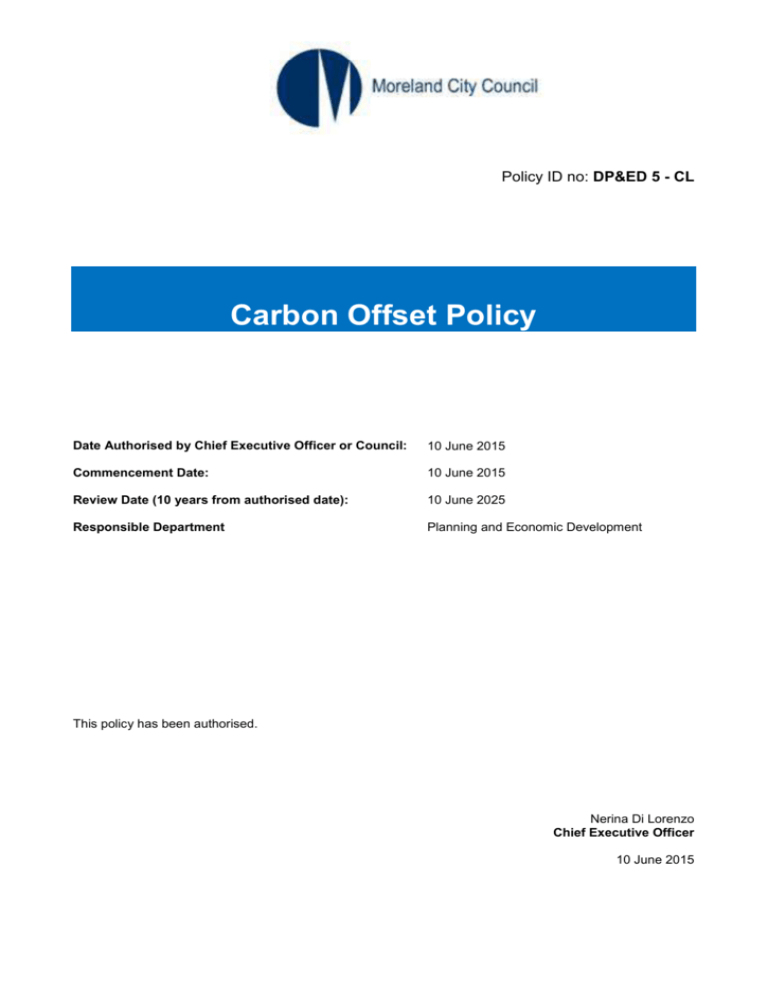
Policy ID no: DP&ED 5 - CL Carbon Offset Policy Date Authorised by Chief Executive Officer or Council: 10 June 2015 Commencement Date: 10 June 2015 Review Date (10 years from authorised date): 10 June 2025 Responsible Department Planning and Economic Development This policy has been authorised. Nerina Di Lorenzo Chief Executive Officer 10 June 2015 1 INTRODUCTION Moreland City Council seeks to position itself as a nationally accredited carbon neutral organisation. Currently accreditation occurs through the National Carbon Offset Standard (NCOS) which is governed by the Federal Government through the Department of Environment. To meet the NCOS carbon neutrality guidelines organisations are required to purchase verified carbon offsets. This policy outlines the various offset options available under NCOS and Council’s approach and criteria to the purchase of carbon offsets. Moreland City Council supports the voluntary carbon market and continues to demonstrate leadership through membership of NCOS. Council invest a significant amount in local climate change actions and initiatives such as the Moreland Energy Foundation, improving the energy efficiency of buildings, installing renewable energy generation on key Council buildings, purchasing Greenpower for the Coburg Civic Centre (largest site) and are currently working with the City of Melbourne and several other organisations to investigate shovel ready local renewable energy generation projects for investment. On top of this Council sees itself as a global citizen and recognises that Australia exports significant amounts of coal and uranium which generates a huge amount of greenhouse gases in predominantly developing countries. International offsets represent the most cost effective offset option and stimulate renewable energy generation in developing countries that would otherwise not occur; therefore Council can contribute not only locally but also globally as part of its Carbon Reduction Plan. 2 CONTEXT In July 2010, the Federal Government introduced NCOS to provide national consistency and consumer confidence in the voluntary carbon market. Moreland City Council achieved carbon neutral status as accredited by NCOS in 2012. Moreland is the second Council in Victoria (and one of five nationally) to become carbon neutral for its corporate operations. To achieve accredited carbon neutrality Council undergoes an audit by NCOS which uses the reporting protocols developed under National Greenhouse and Energy Reporting (NGER) Act, 2007. 2.1 Alignment The Carbon Offsets Policy aligns with: Council Plan 2013-2017 – Vision and Strategic deliverable. Continue to Implement National Carbon Offset Standard/Accreditation for Moreland. Carbon Reduction Policy – outlines a pathway for Council to meet its commitment to reduce carbon emissions and purchase offsets to maintain carbon neutrality. The CRP analyses Council’s corporate carbon footprint, presents energy costs and forecasts and determines the most cost effective approach to achieve its zero net corporate emissions target whilst maximising co-benefits of taking action. While the primary focus of Council’s effort will be to continually reduce direct emissions, it has agreed to purchase internationally accredited carbon offsets for the difference to achieve accredited carbon neutrality using the most cost effective and holistic approach. Procurement Policy – Maintain credible panel of preferred suppliers to purchase accredited offsets. 2.2 Organisational Context To meet NCOS requirements Council is obliged to purchase ‘qualifying’ offsets. If Council chose not to purchase these offsets it could not become verified under the NCOS program and would not meet its commitments under the Council Plan 2013-2017 and the Carbon Reduction Plan 2015. Page 2 2.3 Research and other drivers Offsets A carbon offset is an emissions reduction that is the result of a project implemented by another party. The economic rationale underlying emission offset projects is that the climatic impact of reducing greenhouse gas emissions is the same regardless of where the project is implemented, but the cost of achieving those reductions is likely to differ. The difference in cost provides an opportunity to achieve a desired reduction in greenhouse gas emissions at the lowest possible cost. Council sees purchasing offsets as a credible option for achieving carbon reductions that cannot be readily achieved within its own operations due to its level of control or financial or operational barriers. NCOS stipulates a number of Australian and international schemes that issue carbon units considered to comply with its requirements. These are: Australian Carbon Credit Units issued under the Carbon Farming Initiative; Credits issued under the former Australian Greenhouse Friendly Scheme; Most Certified Emission Reductions from Clean Development Mechanism projects; Most Emission Reduction Units from Joint Implementation projects; Most Removal Units issued under the land use change and forestry provisions of the Kyoto Protocol; Voluntary Emissions Reductions issued by the Gold Standard; and Verified Carbon Units issued by the Verified Carbon Standard. Table 1 Examples of offset projects from selected schemes: Scheme Carbon Farming Initiative Example project Kia Ora Piggery Methane Capture and Destruction Project (Victoria) Clean Development Mechanism 5 MW Biomass Gasification based power project (Sri Lanka) Gold Standard 156.4 MW Changbin and Taichung wind power project (Taiwan) Verified Carbon Standard Bundled wind power projects (Tamil Nadu India) There are clearly a wide range of carbon offsets that meet the requirements of the NCOS. The feature that they have in common is that they comply with a standard integrity framework, which is described in terms of the following features: Additional – abatement must be beyond that required by regulation or undertaken as part of business-as-usual. This criteria is open to reinterpretation in the absence of regulation such as the Carbon Price Mechanism; Permanent – offset must be related to permanent reductions in emissions. For carbon sinks, permanent is considered to be 100 years but the time period is not strictly defined for other emission reduction types; Measurable – emission reductions must be calculated using robust and accepted methods; Transparent – information about the offset projects must be available to stakeholders; Avoid leakage – an emission reduction project must not cause an increase in emissions elsewhere that reduces the benefit of the project; Audited – emission reduction projects must be audited independently; and Registered – offsets must be listed and tracked in a registry. Page 3 Many offset schemes aim to support projects that have benefits beyond carbon reductions. Cobenefits that can result from the implementation of a project include: Education or other benefits that flow from improved quality of life; Biodiversity benefits; Health benefits from pollution reduction; Poverty alleviation through reduced energy costs; Safety improvements from using more advanced technology; Odour and pest reduction due to better waste management. 3 OBJECTIVES To manage its commitment to reducing emissions and becoming carbon neutral, Council will continue to take a strategic approach to investment. Investment in energy efficiency and renewable energy is critical to continue directly reducing greenhouse emissions, reducing Council’s exposure to energy price rises and reducing the costs associated with achieving carbon neutrality. Direct reductions can deliver a number of additional benefits such as improved thermal comfort and improving a building’s resilience to extreme weather such as heat waves. Council adheres to the following Energy Hierarchy to prioritise actions and achieve its greenhouse gas reduction goals. The hierarchy is as follows: 1. Conservation of energy through avoiding carbon intensive activities and assessing business strategy. 2. Energy efficiency in transport, buildings and operations. 3. Renewable energy – installation of local renewable energy generation technology and purchase of accredited renewable energy, such as Green Power. 4. Purchasing of NCOS accredited offsets to reach carbon neutral status. 3.1 Offset Criteria As part of the annual accreditation process, Council will establish a panel of offset providers who meet Council’s requirements and criteria for offsets. When selecting carbon offsets from the panel of providers, Council will use the following criteria to guide purchasing decisions: 1. Only NCOS accredited offsets will be purchased. 2. Carbon offset expenditure will be minimised, including via a strategic approach to Council investment as per the above framework. 3. Validating quality and verification of carbon offsets. 4. Australian generated offsets will be included when available. This includes through the purchase of accredited Green Power (It is noted that Green Power is treated as a zero emissions electricity source under NCOS but considered to represent a form of “offsetting” Council’s emissions through an indirect source). 5. Council will investigate accredited offsets initiatives provided in East Timor that achieve minimal spend. 6. Council will aim to balance the reduction of local carbon emissions (which supports local projects) with supporting global initiatives to reduce emissions in developing economies, subject to Council constraints, capabilities and available technology. 7. Evaluating the co-benefits beyond greenhouse gas mitigation Page 4 4 ROLES AND RESPONSIBILITIES Party/parties Roles and responsibilities Timelines ESD 1. Undertake greenhouse gas inventory. 2. Update and maintain preferred supplier panel for offsets. 3. Purchase accredited carbon offsets. 1. June – October every year 2. Ongoing 1. Oversee implementation of the CRP, Greenhouse inventory and the purchase of NCOS accredited offsets. 1. Bi-monthly board meetings. MP2 Board 5 3. September – October after inventory audit MONITORING, EVALUATION AND REVIEW The CRP MP2 Board will be established as part of the CRP 2015. The Board will oversee implementation of the CRP, Greenhouse inventory and the purchase of NCOS accredited offsets. NCOS is reported to Council annually in June as part of the Carbon Reduction Plan annual report. Council’s greenhouse inventory is required to undergo independent auditing every two years prior to submission. The Federal Government through the Department of Environment undertakes a rigorous assessment of Council’s NCOS application. This Offsets Policy will be reviewed in 2020 in line with the review of the Carbon Reduction Plan. This Policy meets the requirements of the Federal Governments NCOS requirements, therefore if the Federal requirements change within this period, a review will be undertaken to maintain alignment with the Federal program. 6 DEFINITIONS Term Definition Carbon neutral Carbon neutral means that – through a transparent process of measuring emissions, reducing those emissions and offsetting residual emissions – net calculated carbon emissions equal zero. 7 8 ASSOCIATED DOCUMENTS N/a REFERENCES Consultation on the term ‘carbon neutral’: its definition and recommendations for good practice, Department of Energy and Climate Change (UK) 26 February 2009. Page 5
